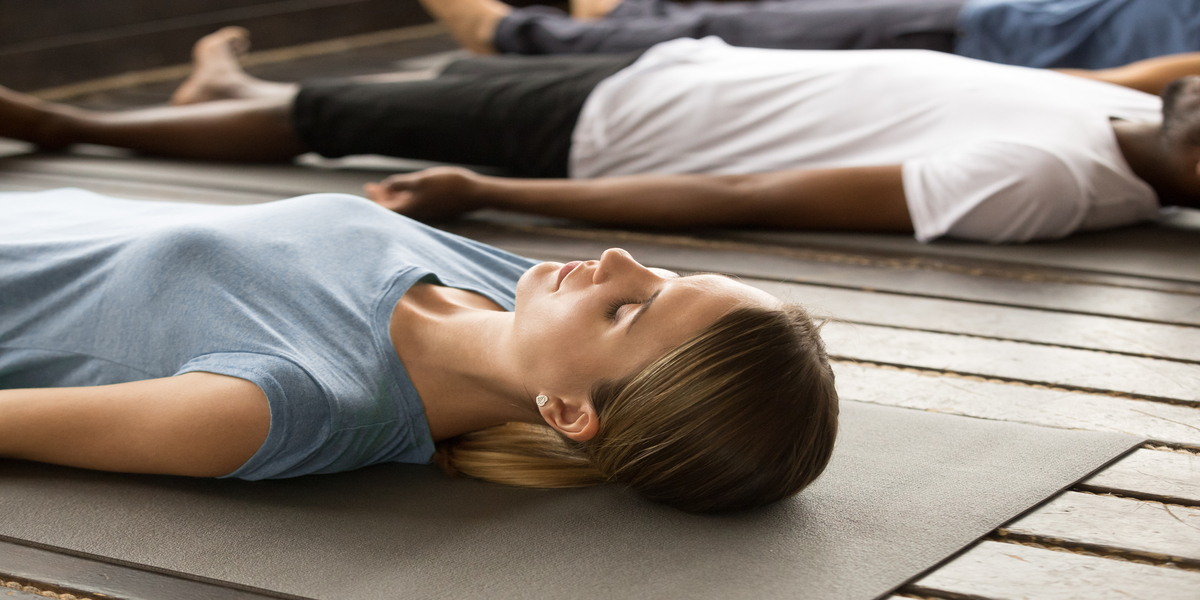
Yoga promotes relaxation as well as deep breathing. These are important for getting a good night's rest. The exercise switches the balance from the sympathetic nervous to the parasympathetic system, which is restorative. This nervous system lowers blood pressure and increases blood circulation to the intestines. Herbert Benson calls this deep relaxation the relaxation reaction. By reducing stress, yoga helps the body achieve better sleep.
Recent research found that those who had been practicing yoga for five consecutive years had significantly lower blood pressures and pulse rates. It is essential to lower your risk of developing heart problems by lowering blood pressure. A study of 113 patients found that yoga can slow the progression of heart diseases. Research suggests that yoga can reduce colon cancer. Yoga's twisting postures were believed to help the body move waste more efficiently.

Yoga can reduce symptoms of post-traumatic Stress Disorder (PTSD). Many people with PTSD find it easier for them to cope with sensory and bodily experiences through yoga. Yoga can also increase emotional awareness, which may help to reduce symptoms. To increase awareness of mind and body, some yoga poses require props. It is not yet clear if yoga will improve the condition of someone suffering from PTSD. But it is worth a look.
Yoga increases blood flow and improves circulation of red blood cells. These red blood cells carry oxygen throughout our bodies. Yoga also thins blood, by cutting the clotting-promoting and protein-promoting proteins. As a result, it leads to a reduction of heart attacks and strokes. Yoga has the potential to improve our overall health. It can also significantly lower blood pressure. This is linked to a decreased risk of developing heart disease.
One of the most important benefits of yoga is its flexibility. When you first start practicing yoga, you might not be able to touch your toes or do a backbend, but with time, you will be able to achieve such goals and feel more confident and comfortable. Also, increased muscle strength and endurance can lead to better mental health. Therefore, it is important to be as flexible as possible.

Yoga can be a form exercise that helps us to reduce stress. Numerous studies have shown that yoga can improve our quality of life. Many studies have found that regular yoga practice results in improved mental and physical health. Also, those who practice yoga report being more relaxed and more aware of their own abilities. Focusing on the breath helps improve digestion which makes it feel calmer and peaceful.
FAQ
Are there 5 ways to have a healthy lifestyle?
Healthy lifestyles include eating right, exercise regularly, getting enough rest, managing stress, having fun, and eating healthy. Avoiding sugar and processed foods is key to eating well. Exercise is good for your body and muscles. Getting enough sleep improves memory and concentration. Stress management is a way to reduce anxiety levels and depression. Fun keeps us vibrant and young.
How can I live the best life possible every day?
The first step towards living your best life everyday is to find out what makes you happy. Once you have a clear understanding of what makes you happy you can go backwards. You can also inquire about the lives of others.
Dr. Wayne Dyer's book "How to Live Your Best Life" is also available. He talks about finding happiness and fulfillment in all aspects of our lives.
How can I control my blood pressure?
Find out the causes of high blood pressure first. Next, take steps that will reduce the risk. You can do this by eating less salt, losing weight, or taking medication.
Also, make sure to get enough exercise. If you don't have time for regular exercise, then try walking as often as possible.
You should join a gym if you are unhappy with your exercise routine. A gym that has other members who are motivated by your goals will be a good choice. You will find it easier to keep to a workout schedule if you have someone to watch you at the gym.
What should you eat?
You should eat lots of vegetables and fruits. They are rich in vitamins that can strengthen your immune system. They are also rich in fiber, which is good for digestion and makes fruits and vegetables filling. At least five servings of fruits and vegetables should be consumed each day.
Water is essential for your body. Water helps flush toxins out of your body and makes you feel fuller between meals. Drink about eight glasses each day.
Choose whole grains over refined grains. Whole grains have all the nutrients they need, including B vitamins. Refined grains are stripped of some of their nutritional value.
Avoid sugary drinks. Sugary drinks can be a source of empty calories, which can lead to obesity. Instead, opt for water, milk, or unsweetened tea.
Avoid fast food. Fast food lacks nutritional value. While it might taste good, it won't give your body the energy it needs to function properly. Use healthier options, such as soups, sandwiches, salads, and pasta.
Limit alcohol intake. Avoid alcohol as it can cause empty calories and poor nutrition. Limit your consumption to no more than 2 alcoholic beverages per week
Red meat consumption should be reduced. Red meats are high in saturated fat and cholesterol. You should choose lean cuts like beef, pork lamb, chicken and fish instead.
Statistics
- In both adults and children, the intake of free sugars should be reduced to less than 10% of total energy intake. (who.int)
- Extra virgin olive oil may benefit heart health, as people who consume it have a lower risk for dying from heart attacks and strokes according to some evidence (57Trusted Source (healthline.com)
- nutrients.[17]X Research sourceWhole grains to try include: 100% whole wheat pasta and bread, brown rice, whole grain oats, farro, millet, quinoa, and barley. (wikihow.com)
- According to the 2020 Dietary Guidelines for Americans, a balanced diet high in fruits and vegetables, lean protein, low-fat dairy and whole grains is needed for optimal energy. (mayoclinichealthsystem.org)
External Links
How To
10 Tips for a Healthy Lifestyle
How to maintain a healthy lifestyle
We live in an era where it is difficult to get enough rest, we eat too often, drink too much alcohol, and use cigarettes. We don’t care enough about our health.
If you are working full time, it can be difficult to keep a healthy diet and exercise regimen. If you feel stressed, it becomes more difficult. Your mind will tell you that this situation is too much so we end up feeling guilty and giving up.
If your body feels ill, it most likely is. You should see a doctor and ask him/her what he/she thinks about your current condition. If there are no signs of something abnormal, stress from your job could be the cause.
Some people think they are lucky because their jobs enable them to regularly go to the gym or have good friends who encourage them to stay fit. They are fortunate. These people have no problems. They control everything. I wish every person could be like them. Most people don't know how balance work and life. Bad habits can lead to heart disease, diabetes, and other diseases.
These tips can help you improve the quality of your life.
-
You should get 7 hours of sleep per night minimum and 8 hours maximum. This means sleeping properly and not consuming caffeine in the hour before bed. Caffeine blocks melatonin, which can make it difficult for you to fall asleep. Make sure your bedroom is dark and clean. Consider using blackout curtains, especially if working late at night.
-
Good nutrition is key to a healthy lifestyle. Avoid sugary foods, fried foods, processed foods, and white breads. Fruits, vegetables, whole grains and whole grains are good options for lunch. Afternoon snacks are recommended to be rich in protein and fiber, such as nuts, seeds, beans, fish and dairy products. Avoid unhealthy snacks such as chips, candies or cookies, cakes, sodas, and other sweets.
-
Drink lots of water. We don't have enough. Water is good for us. It helps us lose more calories, keeps the skin soft and youthful, improves digestion, and flushes out toxins. You will lose weight faster if you drink six glasses of liquid daily. You can determine how hydrated you are by examining the color of your urine. A yellow urine color indicates that you are dehydrated. An orange urine color means that you are slightly dehydrated. Pink urine means that your hydration level is normal. Red urine means that you are overhydrated. Clear urine means that you're highly hydrated.
-
Exercise - Regular physical activity has been proven to increase energy levels and reduce depression. Walking is an easy workout that can also improve your mood. Although walking may seem simple, it is not easy. It requires concentration and effort. Your brain must be able to concentrate on walking, while taking deep breaths and slowing down. A brisk walk for 30 minutes can burn between 100 and 150 calories. Start slow, and then increase the pace. To prevent injury, don't forget to stretch after you exercise.
-
Be positive - Positive thinking is essential for mental health. Positive thinking creates a positive environment within ourselves. Negative thoughts can drain energy and cause anxiety. Try to visualize the things you are aiming to achieve. If you feel overwhelmed by all these new tasks, break down each task into small steps. Remember that you are bound to fail sometimes but just pick yourself up and start again.
-
It is important to learn how to say no. We are often so busy, that we don't realize how much time we spend on unimportant tasks. It is important that you learn to say no when necessary. It is not rude to say 'no'. Simply saying "No" does not mean you are rude. You will always find a way to complete the task later. Be clear about your boundaries. Ask for help. You can also delegate this task to another person.
-
Take care your body. Keep track of what you eat. You can boost your metabolism by eating healthier foods. Do not eat anything too heavy or oily because they tend to raise cholesterol levels. Three meals and two snacks are a good rule of thumb. Aim to consume 2000-2500 calories each day.
-
Meditate - Meditation is a great stress reliever and reduces anxiety. Relax your mind by sitting still with your eyes closed. This exercise will allow you to have clarity of thought which can be very useful in making decisions. Meditation regularly can make you happier and more calm.
-
Do not skip breakfast. Breakfast is the most important meal of each day. Skipping breakfast may cause you to eat more at lunchtime. You don't have to wait until noon to enjoy a healthy breakfast. Eating breakfast boosts your energy and helps you manage your hunger better.
-
Clean eating is key to a happy mood. Avoid junk food and other food items that have artificial or preservative ingredients. These products keep your body acidic and trigger cravings. The vitamins and minerals in fruits and veggies are good for your overall health.